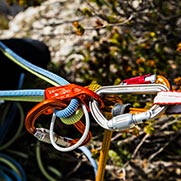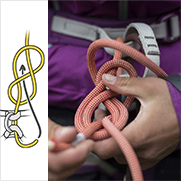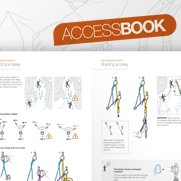RAD LINE: small-diameter hyperstatic cord
The cord sold with the RAD SYSTEM was carefully chosen to be suitable for the intended uses, while being compact and lightweight. Its specific qualities limit its application: it is not as versatile as a normal mountaineering rope.
Warnings
- Carefully read the Instructions for Use used in this technical advice before consulting the advice itself. You must have already read and understood the information in the Instructions for Use to be able to understand this supplementary information.
- Mastering these techniques requires specific training. Work with a professional to confirm your ability to perform these techniques safely and independently before attempting them unsupervised.
- We provide examples of techniques related to your activity. There may be others that we do not describe here.
1. Falling on a hyperstatic cord is dangerous
The rope is an essential component; its energy absorption capacity helps reduce the maximum impact force during a fall. Dynamic ropes have greater energy absorption capacity than static ropes.
A hyperstatic cord has minimal elasticity; it can not absorb the energy of a fall.
- High impact force (peak height of the blue curve)
- Sudden deceleration (slope of first peak of the blue curve)
Comparison test of energy absorption by the rope:
Fall factor: FF 0.4.
0.8 m fall on 2 m of rope with figure-eight knot in each end, knots tightened with 80 kg.
80 kg dummy.
Note:
The test scenario does not correspond to a realistic belay situation; the goal is only to characterize the ropes’ behavior without measurement bias.
The RAD LINE hyperstatic cord must not be used to arrest a fall... unless another element of the system is able to absorb the energy of the fall.
Examples of energy absorption factors in addition to the rope:
- free movement of the belayer
- friction on the rope, for example cutting through the lip of a crevasse
- energy absorbers integrated into the system
2. Compatibility with ascenders
Only the MICRO TRAXION, NANO TRAXION, MINI TRAXION progress-capture pulleys, as well as the TIBLOC, have passed the EN 567 certification tests with the RAD LINE.









